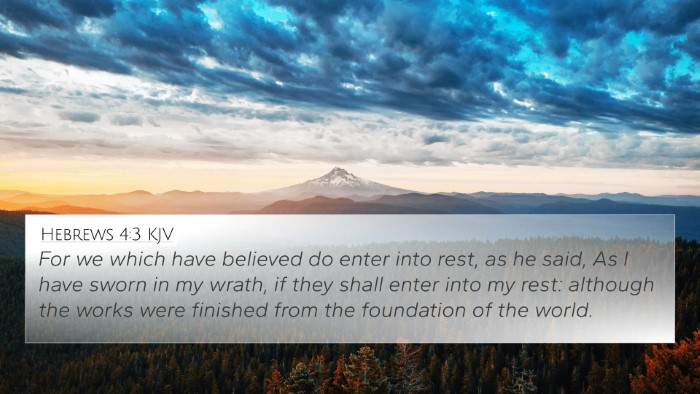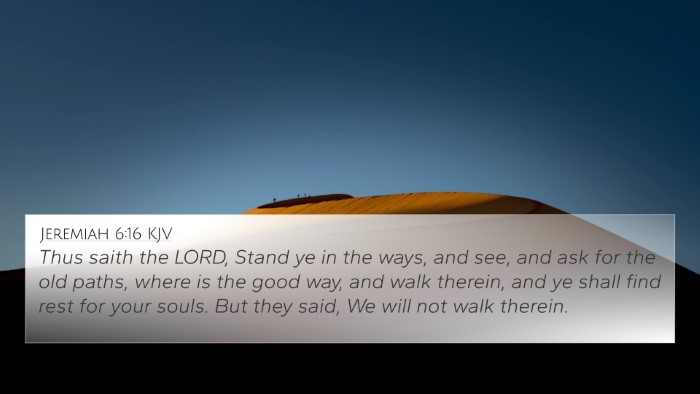Psalms 95:11 - Summary and Interpretation
Bible Verse: Psalms 95:11 - "Unto whom I swear in my wrath that they should not enter into my rest."
Meaning and Interpretation
Psalms 95:11 marks a poignant moment of divine declaration, embodying God's response to disbelief among His people. The psalmist urges the congregation to celebrate God's greatness and to heed the warning against hardening one's heart. This verse serves as a somber reminder of the consequences of rebellion against God.
Insights from Commentaries
- Matthew Henry: Emphasizes the danger of spiritual rebellion and the certainty of divine judgment for those who refuse to believe and enter into His rest. Henry suggests that this "rest" symbolizes a spiritual state of peace and fulfillment found in obedience to God.
- Albert Barnes: Points out that this warning is directed towards a hardened heart, ultimately leading to exclusion from the promised blessings of God. Barnes connects this passage to the fate of the Israelites in the wilderness, reiterating that disobedience leads to severe consequences.
- Adam Clarke: Reflects on the historical context of the Israelites who, through their stubbornness, were barred from entering the Promised Land. Clarke highlights that this verse indicates God’s definitive stance against those who demonstrate persistent unbelief.
Thematic Cross-References
- Hebrews 3:11: "So I swore in my anger, 'They shall never enter my rest.'" - Connects the psalm directly to New Testament teachings about faith and perseverance.
- Exodus 17:2-7: Highlights the rebellion at Massa and Meribah, illustrating humanity's doubts towards God's provision.
- Joshua 5:6: Refers to the Israelites’ journey and their time spent in the wilderness due to unbelief.
- Numbers 14:22-23: God's announcement of judgment against the unbelieving generation that escaped from Egypt.
- Deuteronomy 1:34-35: Details God’s response to the people’s complaints and their failure to trust Him fully.
- Romans 10:21: Paul’s reference to Israel’s disobedience symbolizes the rejection of God's invitation to salvation.
- Matthew 11:28-30: Jesus’ invitation to find rest in Him contrasts the rest that was forfeited by the Israelites due to unbelief.
- Revelation 14:13: Speaks of the eternal rest promised to the faithful, contrasting with those who do not enter God's rest.
Understanding Biblical Rest
The mention of "rest" in this passage signifies more than physical peace; it symbolizes spiritual fulfillment and harmony found in obedience to God. The failure to accept this rest is a profound theological theme, found in both the Old and New Testaments, capturing God’s desire for His people to experience His peace.
Application and Reflection
This verse serves as a call to self-examination. It encourages individuals to reflect on their personal faith and willingness to trust God fully. Believers are prompted to heed the words of the psalmist and avoid the pitfalls of disbelief that led to the Israelites’ exclusion.
Tools for Bible Cross-Referencing
Studying the connections between scripture can deepen understanding of themes such as rebellion, faith, and divine rest. Here are some useful tools:
- Bible concordance for identifying themes and keywords.
- Bible cross-reference guide to find direct linkages between verses.
- Cross-reference Bible study methods for systematic exploration of scripture.
- Bible reference resources that compile related passages.
- Bible chain references to see thematic sequences in the text.
Conclusion
Psalms 95:11 serves as a critical reminder of the consequences of failing to trust in God. Through cross-referencing this verse with others, believers can better understand the rich theological implications of entering into God's rest and the dire warnings against disobedience and lack of faith. By engaging in comparative Bible verse analysis, one can discover deeper insights into God's nature and His relationship with humanity.















